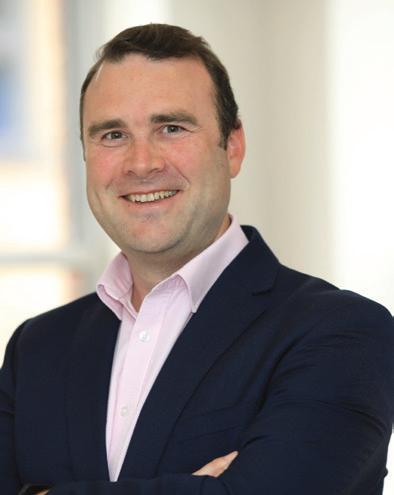
3 minute read
Game Over for Greenwashing
Brands can no longer make vague, unsupported claims to be green. Customer scepticism and upcoming regulatory changes mean retailers will have to validate their green credentials, says Keith

Watt, KPMG’s Head of Retail
Bridging the trust gap with consumers
KPMG’s most recent Next Gen Retail study revealed most brands have work to do to convince consumers they are walking the walk on sustainability, with only a quarter (26%) saying they trust the environmental and sustainability claims made by brands. “Close to two thirds (63%) say brands must do more to inform them of their sustainability credentials. The same proportion agree that brands talk about doing positive things for the environment, but this doesn’t always re ect reality. Younger customers, those under 34, are the most likely to be sceptical of brands’ sustainability claims, with about 70% believing greenwashing is rife,” Keith says.
A crackdown is coming
As the Irish government’s Climate Action Plan stipulates, we must halve our national emissions by 2030 and achieve net zero emissions by 2050. That means every business must play its part – at home and abroad. “International consumer authorities and regulators are getting tough on greenwashing. Other EU states such as the Netherlands have compelled high-street retail brands to stop using potentially misleading terms such as ‘ecodesign’ and ‘conscious’. Soon, every product and service in the EU will be subject to strict greenwashing rules under a coming crackdown. Companies will soon be forced to back up their green claims with hard evidence under a draft European Union law,” he continues.
Make use of funding, training and other support
The journey to sustainability can seem overwhelming, but the good news is you can receive extensive support and funding in the following ways:
• The Sustainability in Retail Handbook from Sustainable Irish Retail Action is one example, covering everything from retrofitting premises and production processes to supply chain improvements and revising your communications.
• Multiple funding sources and allowances are available to promote the circular economy, to support the purchase of energyefficient equipment, to adopt renewable heat and more.
• You can qualify for up to €1m per project from the Sustainable Energy Authority of Ireland’s Excellence in Energy Efficiency Design (EXEED) programme, to become more energy efficient. Companies that export can avail of extensive green transition funding from Enterprise Ireland for both consultancy and capital projects.
• The Climate Ready initiative from Skillnet Ireland offers fully funded and subsidised training for businesses in climate action, sustainability and corporate social responsibility.
EU will demand compliance
Under the new rules, any company making a green claim about a product or service will have to be able to prove it under a sciencebased methodology that covers 16 categories, including clean air and climate change, and across the entire lifecycle of the product. As well as this, the EU is also acting to weed out sneaky tactics, as Keth explains. “Any company that claims its product is sustainable in one way, will have to reveal if it has a negative environmental impact in another way.”
Understand what matters to consumers
Half of the consumers KPMG polled in late 2022 said sustainability was important to them when they buy cleaning products, with 48% saying the same of food and grocery shopping and 45% for clothing. About a third (36%) said it’s important for DIY and home improvement products to be sustainable. The story was similar for electronics (35%), furniture (35%), motor fuel (33%) and toys (30%).
Build trust through commitment and verification
Today’s consumer wants to be con dent they can believe speci c claims on packaging, such as ‘biodegradable’, ‘compostable’ or ‘carbon neutral’. Whether a brand is making claims about its carbon emissions, its water use, how it enables the circular economy or anything else, Keith explains they must be able to point to veri able credentials. “According to our research, 58% say there is not enough information available about brands’ environmental and sustainability credentials.”
Importantly, Keith says retailers can take steps themselves to ensure their customers have green con dence in their products.
“To secure consumer con dence, it’s vital to be able to show trustworthy veri cation. In Ireland, for example, businesses can seek to achieve the Business Working Responsibly Mark, which is veri ed by the National Standards Authority of Ireland.”
“It involves an audit-based assessment every three years. It incorporates best practices from international standards such as the Sustainable Development Goals and ISO standards.”
“Businesses can sign up to Champion Green or achieve the EU Ecolabel or the Fairtrade mark. These certi cations focus on everything from your energy e ciency to your supply chain, waste management to the circular economy.”
KPMG can help you or your business with your transition from brown to green. For further information, visit: kpmg.ie/retail
Niamh Higgins, Managing Director of TapCreative








